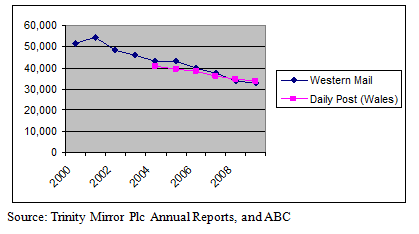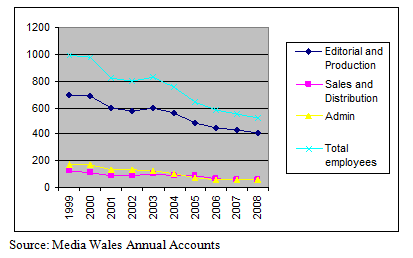It is a truth universally acknowledged that a national newspaper, in possession of a venerable reputation, must be in want of readers. Wales has not one, but two, national papers which are seriously lacking in this respect. Circulations at North Wales’ Daily Post and South Wales’ Western Mail are in serious (some suggest terminal) decline.
In 1979 the Western Mail had a circulation of 94,000; three decades later this has decreased by almost two thirds. In the last ten years circulation fell by 22,000 copies, from 55,000 in 1999 to 33,000 in 2009. In early 2010 the paper’s circulation fell below 30,000 copies for the first time. The Welsh Daily Post is also haemorrhaging readers at an alarming rate. Since 2004 (until then the Post in Wales was produced as part of the Liverpool Daily Post) average circulation has fallen from 41,000 to 34,000.
Parent company Trinity Mirror blames a combination of structural changes in newspaper-buying habits, and competition from the internet. They are partly right, but a large proportion of the blame also lies with sustained mismanagement by a company which has consistently valued the private interests of the City of London over the public interest of the readers and communities it serves.
Chart 1: Falling circulations at the Western Mail and Daily Post (Wales), 2000-2009

Managing Decline: “doing a Cardiff”
Trinity’s market-led business model has a clear primary aim: the generation of large profits for shareholders. The company argues it is also in the business of providing the high-quality news that is essential to full participation in civic and political life. To test this claim, we should look to its actions as well as its rhetoric.
In marked contrast with newspaper owners in the 1980s and 90s, Trinity seems to display little concern that readers are abandoning its titles in droves. Before the current period of intense marketisation, UK local and regional newspaper editors used to rise and fall on the strength of fluctuations in circulation. These days the company deflects criticisms about shrinking readerships with the argument that cherished classified advertisers are interested in “responses” and not in the number of eyeballs to which their ads are exposed. The effect falling circulations have on the quality of the Welsh democratic debating chamber could not be further from their minds. But this effect is plain: with fewer and fewer readers the chances of any newspaper adequately informing the populace are accordingly reduced.
If Trinity sees falling circulations as insignificant, it sees the generation of profit as of paramount importance. Before the consolidation of the newspaper industry in the UK, publishers used to be pleased with profit margins approaching 10 per cent of turnover. Since UK publisher Trinity Mirror bought Media Wales (the subsidiary company which owns the Western Mail along with other Cardiff and South Wales titles) it has consistently posted high profits, with margins well over 20, and more recently 30, per cent. At the time of writing the company had not published its accounts for last year, but the profit margin is expected to be in excess of 10 per cent. This is very healthy considering 2009 brought the worst advertising recession in living memory.
Chart 2: Profitability at Media Wales, 1999-2008
Year
Pre-tax profits (000s)
Turnover (000s)
Profit Margin (%)
1999
9,475
44,508
21.30%
2000
6,374
45,991
13.90%
2001
13,296
49,966
26.90%
2002
15,707
51,998
30.20%
2003
16,241
54,307
29.90%
2004
19,624
55,356
35.50%
2005
20,999
54,956
38.21%
2006
16,341
45,306
36.07%
2007
15,441
50,228
30.74%
2008
18,929
52,102
36.33%
Source: Media Wales Annual Accounts
Such bloated returns are unsustainable, of course, and have mainly been managed by keeping labour costs extremely low and by shedding staff in a series of harsh cuts. Media Wales alone has experienced five rounds of job cuts since 2003, delayed- and non-replacement of staff who leave is endemic, and journalists’ pay is extremely low. The number of editorial and production jobs at Media Wales has fallen by 41% in the last decade. The situation here is so extreme that Trinity Mirror’s regular rounds of job cuts elsewhere have become known to English regional journalists as “doing a Cardiff”.
Chart 3: Staffing Levels at Media Wales, 1999-2008

These cuts are having a devastating effect on the quality of the news. Public interest journalism which is investigative, critical, and which intelligently covers civic and political life is expensive. Even the “beat” system, long the backbone of local and regional journalism, is under pressure. Reporters are finding it increasingly hard to do basic tasks such as get out on their “patch”, make themselves known, cultivate contacts, and gather the news. Instead they are desk-bound, passive, and reliant on resource-rich news sources with efficient public relations teams willing to feed them press releases which can easily be “re-nosed” into shallow and inoffensive news stories. Increasingly, distinctive local stories are making way for cheap homogenous UK national news straight off the agency wires and equally cheap stories about celebrity gossip. This does not foster effective guardianship of the public interest – but it is a direct and predictable consequence of Trinity Mirror’s business strategy.
The Future of Wales’ National Newspapers: further cuts, sell-offs, mergers, “going free”, or a weekly Western Mail?
In the past big profits fuelled by cuts at Welsh newspapers have been siphoned off into bumper dividends for Trinity Mirror shareholders and huge salaries and bonuses for executives. The company has pursued a business strategy that some US media commentators call “squeezing the lemon”: extracting every last drop of profit from its titles, trading on historic reputations, and reaping high advertising yields while the going is good.
But the going, at the moment, is resolutely not good. In contrast to Media Wales parent company Trinity Mirror’s current economic woes preclude the possibility that Welsh profits will be turned into City benefits. Instead they will be used to keep the parent company afloat and plug a growing deficit. Between 1999 and 2005 it repeatedly posted healthy profit margins between 13 and 19 per cent. In recent years, however, it has twice seen alarming losses in excess of £73 million and more are expected for 2009.
Chart 4: Profitability at Trinity Mirror, 1999-2008
Year
Pre-tax profits (000s)*
Turnover (000s)
Profit Margin (%)
1999
116,000
596,800
19.46
2000
154,100
1,080,300
14.26
2001
155,500
1,131,100
13.75
2002
155,500
1,092,200
14.24
2003
172,500
1,095,100
15.75
2004
216,800
1,141,700
18.99
2005
209,500
1,122,000
18.67
2006
-73,100
1,053,000
-6.94
2007
21,000
971,300
2.16
2008
-73,500
871,700
-8.43
Source: Trinity Mirror Plc Annual Reports
In addition to these losses the company faces alarming levels of debt at a time when the banks are increasingly reticent to lend or renegotiate loan repayments. In 2009 it revealed bank loans of £324 million, £146.1 million of which is due to be paid back in 2011. If the bank were to refuse to renegotiate this loan Trinity could find itself in serious trouble. It also has to contend with a growing pension deficit which by March 2010 stood at £296 million. What is the solution to these serious problems, and how will they affect the Welsh titles? When times are bad and profits dry up those in charge of Trinity Mirror can imagine no other solution than to make further cuts.
It is, of course, difficult to tell exactly what the company has in store for our national papers, but possible indicators lie in the kinds of efficiency savings made at some of its English regional titles. It is almost certain that Welsh newspapers will suffer further staffing cuts. In 2008 the company shed 1,200 jobs, redundancies continued to be announced throughout 2009, and more have been promised. There will also be increased pressure to reduce production costs using “cookie cutter” publishing programmes which bypass the need to sub-edit, design and proof news content before publication. But a series of more drastic potential solutions also hover unnervingly on the horizon, all of which might prove very dangerous for the futures of Western Mail and the Daily Post.
In the past Trinity has tried to sell its way out of trouble. In 2007 the group attempted to dispose of its regional titles in the Midlands, London and the South East but failed to attract a buyer because of its huge pension deficit. The still-profitable Welsh papers could be sold to raise funds. But Wales’ problems would not be solved by a sale to other industry behemoths such as Newsquest or Johnston Press. These companies operate in exactly the same way as Trinity Mirror.
There is growing unease among journalists and commentators that newspaper markets in UK cities are unable to sustain both morning and evening titles. This fear is evident in some of Trinity Mirror’s actions over the last year. In Liverpool, for example, the Echo and the Daily Post, formerly evening and morning papers respectively, have effectively been forced into competition with each other by changes in deadline structures and printing schedules. Some fear the eventual consequence of this will be a merger or the demise of the weaker newspaper.
Trinity recently acquired the Guardian Media Group’s local and regional titles, of which the flagship Manchester Evening News is currently one of the largest regional dailies to be given out free (the paper is free in the centre of Manchester, but punters must pay if they buy it in the suburbs). Free newspapers are advertiser-led, and generally lead to smaller staffs and poorer-quality, less distinctively local, coverage. If the Western Mail “went free” it would be placing itself in competition with the Media Wales-printed Cardiff Metro.
Another possibility is a radical scaling-back of the amount of content newspapers produce. Last November the Birmingham Post was transformed from a daily to a weekly printed paper with more regular updates online. Costs were cut significantly, staffing levels were stripped to the bone, and a 152-year old regional daily newspaper all-but disappeared. Trinity Mirror’s efficiency drives have already led to reductions in pagination and fewer published editions of the Western Mail and the Daily Post. It is distinctly possible that one or both could be transformed into cheaper weeklies.
The depressing fact remains that as long as proprietors value the pocketbooks of shareholders above the quality of the news and the welfare of audiences and staff, the Welsh public sphere is likely to be further diminished.
Andy Williams is a research fellow at the Cardiff school of Journalism, Media and Cultural Studies.
Read more
Get our weekly email
Comments
We encourage anyone to comment, please consult the oD commenting guidelines if you have any questions.